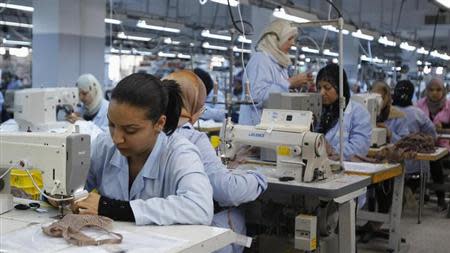Tunisia cuts GDP growth, raises deficit forecasts

By Tarek Amara TUNIS (Reuters) - Tunisia's economy will expand less quickly than hoped this year, with GDP growth now forecast at 3.6 percent compared to 4 percent previously, its finance minister said on Friday, putting partial blame on slower growth in Europe. The budget deficit in the North African state is also projected to be wider than expected at 7.4 percent of GDP compared to the earlier estimate of 5.1 percent, Finance Minister Elyess Fakhfakh said. He added that he expected total debt to reach 48 percent of GDP this year from 46 percent previously expected and warned it could rise to 52 pct if salaries continue to go up. Fakhfakh cited slower economic growth in Europe and higher Tunisian government spending for the revised estimates. He did not mention the political crisis that has paralysed the government in Tunis for a month. Tunisia last month slid into its worst political crisis since the overthrow of autocratic president Zine al-Abidine Ben Ali in January 2011. Government and opposition leaders are trying to find a negotiated way out of the deadlock. "As a result of the continuing crisis in Europe, Tunisia has revised its growth forecast again from 4 percent to 3.6 percent," the minister said. The Islamist-led government cut its forecast for full-year 2013 growth in April to 4 percent from 4.5 percent. "The deficit will widen to 7.4 percent instead of 5.1 percent forecast for this year," Fakhfakh added, saying extra government spending on salaries and subsidies amounted to 1.9 billion dinars. The Tunisian economy grew 3.6 percent last year and is still struggling to recover from the social and political turmoil that followed the uprising against Ben Ali. Tunisia, which has signed a $1.7 billion standby loan agreement with the International Monetary fund (IMF), is struggling with rising inflation and a large external deficit as well as its uncertain political outlook Standard & Poor's Ratings Services this month lowered its long-term foreign and local currency sovereign credit ratings on Tunisia to B from BB- and said the outlook was still negative. The country's secular opposition, angered by two murders of left-wing politicians and emboldened by Egypt's army-backed ouster of an Islamist president, has held mass protests and insisted the government must resign and allow new elections. Tunisia's foreign currency reserves are sufficient to pay for just 94 days of imports due to a plunge in foreign investments and tourism revenues. That puts Tunisia for the first time below the level the central bank considers adequate. Tunisia's parliament last month passed a law to allow the state to issue a sovereign sukuk bond to raise $700 million, a move that could help narrow the budget deficit.

 Yahoo Finance
Yahoo Finance 